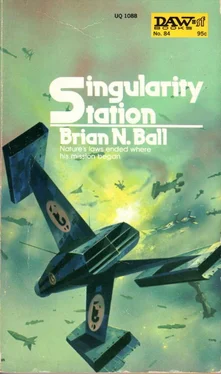Liz Deffant stared, unable to restrain a choking gasp of awe at his struggle. There was a primeval force loose on the bridge: Maran, that strange elemental being that was so remote from a humanity he sought to explain, was trying to wrest the ship out of the Singularity’s grip. And it was no use. A penumbra of black light flooded the bridge. The bright-painted walls buckled. And still Maran stood at the console. Even though the ship was breaking up about him, Maran held the machines to his purpose. In a tormented delirium, Buchanan called for every particle of energy the station could exert. He drove the small vessel through the writhing, serpentine coils with the fury of desperation. The ship spun wildly, gripped on a writhing hump of uncanny forces, and eased itself toward the boiling fields where the ES 110 hung. Skills acquired in years of infragalactic flight among the reefs of hyper-space enabled him to squeeze the Jansky Station nearer and nearer the fraying transport. Liz! his mind was yelling, but he said nothing. Not until a rumble of metallic discontent came from the machines. He silenced it bitterly: “Get nearer the ES 110 !”
“Sir, starquake emission reports show as yet uncharted emissions. The transport is in a configuration of maximum danger!”
“All engines at ultimate power! Any risk—get near that ship!” Buchanan watched the vessel shredding. A decaying area of black light hung around the drive housing. There was little to show that its remaining engines still functioned; a jagged scar was all that remained of one engine pod. The ES 110 trembled and fluttered like a wounded insect spuming on its axis and describing a powerless course within the serpentine coils that were drawing it into the vortex. It was the Altair Star all over again, but this time it was so much worse. Buchanan could feel Kochan’s corrosive grief as if it were his own, Liz, joining the silent long-gone who might not be dead! Not a company of expellees—not Enforcement Service crewmen who would have known the risks of their job—not impersonal strangers one could feel a real but distant pity for: it was Liz Deffant who was being taken into the black pit. And Maran.
Buchanan tried again to gain contact with the doomed ship.
“Buchanan at the Jansky Station calling Maran!” Before he had known that Liz was aboard the ES 110
he had not been able to use Maran’s name. Not directly. Now, he would do anything.
“Maran!” Even though it was hopeless, he tried. “Maran, this is Buchanan! I’m trying to get near you! This is a special research ship—I’ll try to reach you!”
But what could he do then? Within the station he was safe—it had weathered the uncertainties of the Singularity even when starquake had occurred to multiply its hazards. But how could he reach the ES 110? How could he or anyone from the ship cross the wild and bizarre regions?
Buchanan turned to the machines. Set up the possibilities, he ordered. Soon, the Grade One robot answered.
Impossible, came the reply. Impossible to build any kind of space-raft that would be capable of withstanding the stresses of the Singularity.
He ordered a fresh analysis, given the wildest freaks of chance.
It responded glumly.
Given luck, admitted the robotic controller, a gap might be found through which a small fragment of the ES 110 could be ejected into a safer framework of dimensions, perhaps even to the cruisers. But there had to be massive initial thrust. It demonstrated a series of possibilities, and Buchanan’s hopes died. With luck—with the most freakish luck, the right combination of energy fields and the abrupt force of the ship’s engines, some kind of life-raft could be blasted clear of the Singularity. Buchanan scanned estimates, forecasts, projections.
“Well?” he asked, knowing the answer.
No, the Grade One robot said judicially, not in the case of the ES 110. Its power-levels were too low. Absurdly low.
The small miracle of the Altair Star would not be repeated.
There would be not even one survivor.
Without hope, Buchanan would not give up.
“Maran! Put the woman Deffant in a life-raft!” he yelled into the blankness before him. “Yourself too—I swear I’ll try to save you! The robots say it can’t be done, but maybe I can get some kind of field rigged up—try, Maran! Get a life-raft made. For you—and the woman!” The fatigue showed in Maran’s face. His eyes were opaque, their hypnotic beauty dimmed. Through the sound of metal shrieking, force-screens Jangling appallingly, and distant systems advising that they were defunct, Liz could hear his grated orders. He would not surrender to the inevitable. The man was invested with a rage to survive, and Liz was freshly amazed at the supremacy of his vision. He played the machines as if they were delicate music, and while they gradually lapsed into quiescence he soothed them, wringing each last note of power as they died. When she recalled how she had tried to shoot him with the ponderous, archaic weapon, Liz could have wept. She felt no more bitter anger at Maran. It was a betrayal of her regard for the young man she had known for such a short time; it was a betrayal, too, of all her instincts and training; yet she could not hate Maran, either for what he had done so horribly to his deluded followers, or for the murder of the Enforcement Service personnel. There was a pitiable quality in his desperation. And she pitied him.
Al Buchanan’s voice seemed part of the nightmare at first.
“…I swear I’ll try to save you! The robots say it cant be done, but maybe I can get some kind of field rigged up—Try, Maran!” His voice rang through the black-flooding bridge. “Get a life-raft made. For you—and the woman!”
Liz realized that she had not thought of the station as a means of help. So bewildered had she been that she had thought of Al as nearby but not within possible reach. And this was his voice calling with a contained desperation to Maran! And to a woman.
Did he know she was on the ship?
“I repeat—get the woman Deffant and yourself into a life-raft!” Liz cried out in pain, relief, abandoned joy, frustrated happiness.
Maran reacted instantly. “Reciprocal contact! Get me this Buchanan!” Failing systems hoarsely assured him that they would try. He wove his big white hands over the console and armored servitors appeared. Suddenly the bridge was alive with movement, where before it had seemed a dying organism.
“Miss Deffant! This station—you know it?”
Liz tried to refuse the information. Al was trying to reach her, but Maran was a deadly threat to the hundreds who might be involved in his next series of grotesque experiments, to thousands who might follow them. But she could not. She had reached the end of her ability to resist the urge to live. Al was the voice of promised life. She could not deny the promise. And she could not speak. Intently, Maran said to her: “I thought I should never say this to another person, Miss Deffant, but I must do so. Do not think I talk to you in this way because I am afraid to die—I am not. I am talking to you as an equal—and for the first time to any man or woman!—because I care that you understand. I do care that you have the facts. That you are able to judge for yourself why I have to survive now—that I have to reach this man Buchanan who means something to you. I must have your confidence and his help, and this is why. Listen.”
And, strangely in the midst of preparations, clamorings, fee noises of the disintegrating ship and the robots’ exchanges, Liz listened with the deepest attention.
“I know,” said Maran, “that there are farsighted and dedicated men and women in positions of authority who would help me. They know the value of my work and they know that I am the only man who can do it They know Maran is unique. They admit that there should be agencies of change in the Galaxy if man is to venture beyond it. Before he can go farther out to the ends of the Universe, he must first learn to explore himself. Miss Deffant, the key to all knowledge is in here!” Maran rested his hands on his sweating head. He had the look of a visionary priest who is ready to make a prophecy.
Читать дальше












